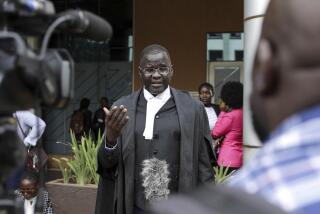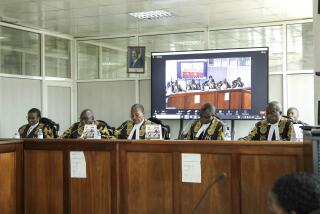Gay rights? Not in Uganda
Uganda’s ignominious anti-gay bill is back in play. After being deservedly relegated to legislative limbo last year, the bill, which would expand the definition of what constitutes a homosexual “crime” in the country’s statute books, is once again under consideration in the Ugandan parliament. In its original form, the anti-homosexuality bill would have allowed for the death penalty against serial offenders. Now, a legislative committee has apparently recommended that the bill be brought before the full parliament for debate, but with the death penalty replaced with life imprisonment. Obviously, that’s still ludicrous punishment for something that shouldn’t be considered a crime at all.
Uganda already outlaws homosexual activity, as do 30 other African countries on a continent that is notoriously homophobic. People are occasionally arrested but rarely convicted under the homosexual activity law, according to Maria Burnett, senior Africa researcher for Human Rights Watch. But the proposed law would dramatically expand what the government considers a crime. It would, for instance, “prohibit the licensing of organizations which promote homosexuality,” which could be interpreted to include groups that promote the rights of the lesbian, gay, bisexual and transgendered community. Touching someone with the “intention” of gay sexual activity would be an offense. It would even “impose a duty on the community to report suspected cases of homosexuality.”
Americans should perhaps not be too smug in opposing the Ugandan law. It wasn’t so long ago that the United States had its own anti-sodomy laws on the books; in fact, only in 2003 did the U.S. Supreme Court hand down its landmark ruling in Lawrence vs. Texas declaring all such laws unconstitutional.
But the U.S. has been evolving along with the rest of the world. Now it’s time for Uganda to do the same. The criminalization of gay behavior cannot simply be explained away as part of a country’s cultural mores; rather, it is an outrageous violation of fundamental human rights.
More to Read
A cure for the common opinion
Get thought-provoking perspectives with our weekly newsletter.
You may occasionally receive promotional content from the Los Angeles Times.






